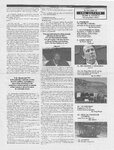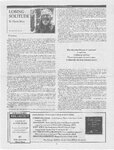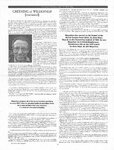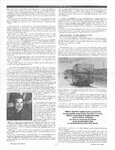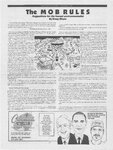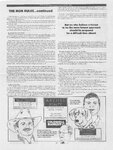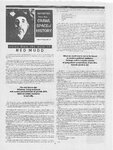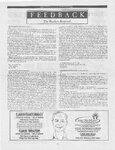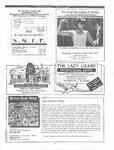| OCR Text |
Show THE ZEPHYR/AUGUST-SEPTEMBER 2008 Consider this claim from the Xerces Societys magazine, Wings. “For the urban dweller it is the orange and black flash of a monarch, rather than a tiger Noticing nature can be or jaguar, the call of the katydid instead of the howl of coyotes, that provide our most intense moments for remembering that even our biggest metropolises are part of some- thing greater.” Introduction: Insects and the City, by Sasha Spector. “... part of something greater,” that’s a hard truth. I argued once with Howard Zahnhiser about working to save all lands, wild or notthin the borders of the United States. He, in his soft-spoken way, corrected me. His position was that the Wilderness Society’s focus had to be on public lands. Other organizations would take care of the rest. Well, Nature Conservancy has done good work in buying private land and turning it over to public caretakers, but buying land takes money, huge chunks of money. Nature Conservancy has no alternative, it’s part of the market economy, embedded in the places where money is found. That means going along to get along. Unfortunately, as with the Cloudrock development in Utah and the huge development in the center of California’s Condor country, the builders of havens for rich folks seem to go unchallenged by environmental outfits. Why is this? Let's recognize that money rules, and its rules are rigid. Money can buy tame policies, such as keeping up the drumbeat for pristine places where a small minority of humans can visit, continuing the imaginary division between built places--cities and throughways et al.--and escape places. That does not upset the apple cart too much. Rich moguls can give generously, and even govern environmental organizations, feeling they are doing their part to save nature, just as they green their corporations with superficial changes that do not cut too far into profits. Corporations crow in public now, about that magic formula: that “business as usual” and “going green” can get along nicely. That’s what keeps us from lifting a finger to actually slow our use of energy, slow climate change and the mad lifestyle we're all trying to adapt to. We try to believe in our own blind trust in the way things are, but are we firm believers? I doubt it. about the starry night, the universe, but it is also about small matters such as the whiff of perfumes wafting across sage and taking in the taste of spruce along the way. We have been in southern Ohio for a few days. I am amazed at the diver- sity of butterfly species. I can’t identify any of them and don’t need to. Must be at least ten different kinds fluttering around this yard and in the woods. On a walk along the gravel road I waded through a storm of butterflies. I also have chigger bites, reminding me that this is not the Garden of Eden. There is nothing at all glamorous about chigger bites, just as there is nothing as hazardous as confronting a big brown bear on the north slope of Alaska or a mountain lion in California. _ Is there another way of doing varmental/conservation business without teaming up with zillionaires ? You will have noticed a lot of earnest blather in outdoor writing about being part of nature. I wish we really meant it, deeply in our hearts and minds. That would be a base, a start along a different path that leads away from business as usual and the art of the politically possible... a turning our backs on ”the way things are,” where money rules. It would be a brushy path, hard to see very far ahead, but our feet would guide us. We might trust those feet. Along that path are ways of creating justice for all of our species and forward to full democracy, inside our movements as well as throughout our society. Then we can get together and work out dramatic, romantic (sure, why not?) and truly effective ways to begin to save the Earth. A turn like that can be a hard road. Can we do it? No one knows. I hear the bell tolling. Do you hear it? Note: I borrow the varmentalist term from Tom Lynch, professor of English and a varmentalist at University of Nebraska, Lincoln. Tee Ta Hl GARDENS Henry David Thoreau wrote an essay, Walking. Walking, a human-paced activity, motion in the world allowing close observation and enjoyment. However, on Ktaadn in Maine he felt more impressed than usual by Nature's total indifference, almost hostility. My friend and colleague , Charlotte Meyers, suggests that Thoreau might have felt there were places on the planet, the “extreme wild,” that we might explore, but let us not stay. I think Ed Abbey had similar thoughts. He went so far as to suggest that wilderness feeling they are doing their part Tenn eeen Rich moguls can give generously, and even govern environmental organizations, PENSTEMONS might be best left alone: we know it’s there, but it exists for itself and the creatures who are best adapted to lifetimes there. I once felt that this was an extreme suggestion, making wilderness off-limits, requiring border guards. I’ve had second thoughts. The way things are going now, outdoor recreation in wild or semi-wild country, is an artificial collection of predetermined goals promoted by the amenities economy---the planning of adventure by someone in a corporation’s office cubicle. THE CUTEST & BEST NURSERY IN THE WORLD IS FOR SALE LuDean Merritt, GRI 435.719.6567 a am 2771 §. HIGHWAY 191 com (across from Stagecoach Cafe’) 435.259.4531 the other creatures who are, as we are, full partisans in and of Nature. That alertness can extend to those of our own species, especially those who don’t agree with us. I’ll venture to say that a minimal requirement for the future well-equipped varmentalist has to be the fine art of listening. g=PLUMBING =. dan. 3& HEATING 259-8324 Residential - Commercial~ Sales Installation - Drain Cleaning COMPLETE LINE OF PLUMBING FIXTURES e _Kohler - Grohe - Mansfield Ejer - Moen - Delta - Sterling - Price Pfister HOT WATER HEATERS - GARBAGE DISPOSALS WHIRLPOOL BATHS - SPAS CINDY McCAIN visits RICK! When I've got __ FROZEN PIPES, I just call THE ICE QUEEN. That girl knows what ICE is all Siaeeeh ment! How do you “plan” an adventure? Can’’t be done. There is no better way to lose contact with “the wild” than this pernicious, money-driven treatment of human creatures as nothing but consumers of planned adventure, aka wreckreation. Let's keep firmly in mind that walking is not jogging; It consists of sitting and standing and moseying along. Can’t we be walkers, each of us at our own pace, without preconditions, paying attention to what is actually there? Here’s a revolutionary thought: abandon the know-it-all arrogance of the typical varmentalist, substitute an awareness that includes a finely honed ability to pay attention to PENSTEMONS to save nature, just as they green their corporations with superficial changes that do not cut too far into profits. |


